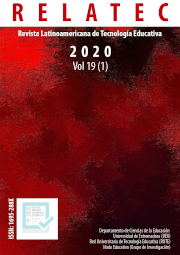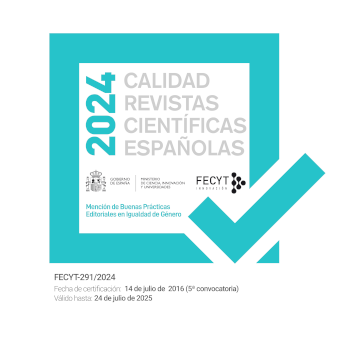Nutrikids: juego serio para el desarrollo del conocimiento nutricional en niños y adolescentes.
DOI:
https://doi.org/10.17398/1695-288X.19.1.93Palabras clave:
Educación nutricional, Juegos Serios, Obesidad, Investigación Educativa, Tecnología EducativaResumen
La obesidad se identifica como una epidemia global que desencadena consecuencias como una mayor morbilidad, un mayor riesgo de desarrollar dolencias metabólicas, enfermedades cardiovasculares, hepáticas, cáncer, diabetes, entre otras. El conocimiento sobre nutrición y alimentación saludable en niños y adolescentes es una de las alternativas que se destacan para la prevención. Por lo tanto, este artículo presenta la evaluación del aprendizaje resultante de la aplicación del juego Nutrikids. Este juego fue desarrollado para aumentar el conocimiento nutricional en niños y adolescentes. Para ello, se realizó un estudio cuasi-experimental aleatorizado por grupo con 105 estudiantes de 9 a 12 años de dos escuelas públicas brasileñas, que se dividieron en el Grupo Aula que recibió información a través de clases expositivas (n = 51) y el Grupo Jogo quienes recibieron la misma información a través del juego Nutrikids (n = 54) que recibieron intervención durante un mes, a menudo una vez por semana durante treinta minutos. Para evaluar el conocimiento nutricional, los grupos realizaron una prueba previa antes del inicio de la intervención y una prueba posterior al final. Se observó que ambos grupos aumentaron su conocimiento nutricional y que Game Group obtuvo un mayor efecto en el aprendizaje y una mejor evaluación, independientemente del género. Por lo tanto, el uso del juego Nutrikids demostró ser más efectivo para enseñar conocimiento nutricional en comparación con las clases expositivas tradicionales.
Descargas
Referencias
Ashley, P., & Gilbert, S. R. (2018). Obesity in Pediatric Trauma. Orthopedic Clinics of North America, 49(3), 335–343. https://doi.org/10.1016/j.ocl.2018.02.007
Battistella, P. E., & Wangenheim, C. G. von. (2016). ENgAGED: Um Processo de Desenvolvimento de Jogos para Ensinar Computação. Anais Do XXVII Simpósio Brasileiro de Informática Na Educação (SBIE 2016), 1(1), 380. https://doi.org/10.5753/cbie.sbie.2016.380
Berentzen, T. L., Gamborg, M., Holst, C., Sørensen, T. I. A., & Baker, J. L. (2014). Body mass index in childhood and adult risk of primary liver cancer. Journal of Hepatology, 60(2), 325–330. https://doi.org/10.1016/j.jhep.2013.09.015
Biro, F. M., & Wien, M. (2010). Childhood obesity and adult morbidities. In American Journal of Clinical Nutrition (Vol. 91, Issue 5). Am J Clin Nutr. https://doi.org/10.3945/ajcn.2010.28701B
Bourgonjon, J., Valcke, M., Soetaert, R., & Schellens, T. (2010). Students’ perceptions about the use of video games in the classroom. Computers and Education, 54(4), 1145–1156. https://doi.org/10.1016/j.compedu.2009.10.022
Brasil, Ministério da Saúde. (2006). Guia alimentar para a população brasileira, 1ª edição. Recuperado a partir de http://bvsms.saude.gov.br/bvs/publicacoes/guia_alimentar_populacao_brasileira_2008.pdf
Brasil, Ministério da Saúde. (2014). Guia alimentar para a população brasileira. 2ª edição. Recuperado a partir de: http://bvsms.saude.gov.br/bvs/publicacoes/guia_alimentar_populacao_brasileira_2ed.pdf
Brasil, Ministério da Saúde. (2018). Vigitel Brasil 2017: Vigilância de fatores de risco e proteção para doenças crônicas por inquérito telefônico. Recuperado a partir de https://portalarquivos2.saude.gov.br/images/pdf/2019/julho/25/vigitel-brasil-2018.pdf
Chang, C. C., Liang, C., Chou, P. N., & Lin, G. Y. (2017). Is game-based learning better in flow experience and various types of cognitive load than non-game-based learning? Perspective from multimedia and media richness. Computers in Human Behavior, 71, 218–227. https://doi.org/10.1016/j.chb.2017.01.031
Chu, D. T., Minh Nguyet, N. T., Nga, V. T., Thai Lien, N. V., Vo, D. D., Lien, N., Nhu Ngoc, V. T., Son, L. H., Le, D. H., Nga, V. B., Van Tu, P., Van To, T., Ha, L. S., Tao, Y., & Pham, V. H. (2019). An update on obesity: Mental consequences and psychological interventions. In Diabetes and Metabolic Syndrome: Clinical Research and Reviews (Vol. 13, Issue 1, pp. 155–160). Elsevier Ltd. https://doi.org/10.1016/j.dsx.2018.07.015
Coller, B. D., & Scott, M. J. (2009). Effectiveness of using a video game to teach a course in mechanical engineering. Computers and Education, 53(3), 900–912. https://doi.org/10.1016/j.compedu.2009.05.012
Cohen, J. (1992). A power primer. Psychological Bulletin, 112(1), 155–159. https://doi.org/10.1037/0033-
2909.112.1.155
Dias, J. D., Mayara, C., Tibes, S., Mara, L., Fonseca, M., & Zem-Mascarenhas, S. H. (2017). Uso de serious games para enfrentamento da obesidade infantil: revisão integrativa da literatura. Texto & Contexto Enfermagem, 26(1), 1-10. http://dx.doi.org/10.1590/0104-07072017003010015
Dicheva, D., Dichev, C., Agre, G., & Angelova, G. (2015). Gamification in Education: A Systematic Mapping Study. Journal of Educational Technology & Society, 18(3), 75–88. https://doi.org/10.2307/jeductechsoci.18.3.75
GBD 2015 Obesity Collaborators. (2017). Health effects of overweight and obesity in 195 countries over 25 years. New England Journal of Medicine, 377(1), 13–27. https://doi.org/10.1056/NEJMoa1614362
Geserick, M., Vogel, M., Gausche, R., Lipek, T., Spielau, U., Keller, E., Pfäffle, R., Kiess, W., & Körner, A. (2018). Acceleration of BMI in Early Childhood and Risk of Sustained Obesity. New England Journal of Medicine, 379(14), 1303–1312. https://doi.org/10.1056/NEJMoa1803527
Gjærde, L. K., Gamborg, M., Ängquist, L., Truelsen, T. C., Sørensen, T. I. A., & Baker, J. L. (2017). Association of childhood body mass index and change in body mass index with first adult ischemic stroke. JAMA Neurology, 74(11), 1312–1318. https://doi.org/10.1001/jamaneurol.2017.1627
Erhel, S., & Jamet, E. (2013). Digital game-based learning: Impact of instructions and feedback on motivation and learning effectiveness. Computers and Education, 67, 156–167. https://doi.org/10.1016/j.compedu.2013.02.019
Huizenga, J. C., ten Dam, G. T. M., Voogt, J. M., & Admiraal, W. F. (2017). Teacher perceptions of the value of game-based learning in secondary education. Computers and Education, 110, 105–115. https://doi.org/10.1016/j.compedu.2017.03.008
IBGE. (2010). Pesquisa de Orçamentos Familiares 2008-2009: antropometria e estado nutricional de crianças, adolescentes e adultos no Brasil. IBGE. Recuperado a partir de: https://biblioteca.ibge.gov.br/visualizacao/livros/liv45419.pdf
Jensen, B. W., Bjerregaard, L. G., Ängquist, L., Gögenur, I., Renehan, A. G., Osler, M., Sørensen, T. I. A., & Baker, J. L. (2018). Change in weight status from childhood to early adulthood and late adulthood risk of colon cancer in men: a population-based cohort study. International Journal of Obesity, 42(10), 1797–1803. https://doi.org/10.1038/s41366-018-0109-y
Kiili, K., Moeller, K., & Ninaus, M. (2018). Evaluating the effectiveness of a game-based rational number training - In-game metrics as learning indicators. Computers and Education, 120, 13–28. https://doi.org/10.1016/j.compedu.2018.01.012
Meo, S. A., Altuwaym, A. A., Alfallaj, R. M., Alduraibi, K. A., Alhamoudi, A. M., Alghamdi, S. M., & Akram, A. (2019). Effect of Obesity on Cognitive Function among School Adolescents: A Cross-Sectional Study. Obesity Facts, 12(2), 150–156. https://doi.org/10.1159/000499386
Nishtar, S., Gluckman, P., & Armstrong, T. (2016). Ending childhood obesity: a time for action. The Lancet, 387(10021), 825–827. https://doi.org/10.1016/S0140-6736(16)00140-9
Onis, M. D. (2015). Preventing childhood overweight and obesity. Jornal de Pediatria, 91(2), 105–107. https://doi.org/10.1016/j.jped.2014.10.002
Parmenter, K., & Wardle, J. (1999). Development of a general nutrition knowledge questionnaire for adults. European Journal of Clinical Nutrition, 53(4), 298–308. https://doi.org/10.1038/sj.ejcn.1600726
Peters, U., Dixon, A. E., & Forno, E. (2018). Obesity and asthma. In Journal of Allergy and Clinical Immunology (Vol. 141, Issue 4, pp. 1169–1179). Mosby Inc. https://doi.org/10.1016/j.jaci.2018.02.004
Phatak, U. P., & Pashankar, D. S. (2014). Prevalence of functional gastrointestinal disorders in obese and overweight children. International Journal of Obesity, 38(10), 1324–1327. https://doi.org/10.1038/ijo.2014.67
Prensky, M. (Ed.). (2012). Aprendizagem baseada em jogos digitais. São Paulo: SENAC.
Pulgarón, E. R. (2013). Childhood Obesity: A Review of Increased Risk for Physical and Psychological Comorbidities. In Clinical Therapeutics (Vol. 35, Issue 1). Clin Ther. https://doi.org/10.1016/j.clinthera.2012.12.014
Rankin, J., Matthews, L., Cobley, S., Han, A., Sanders, R., Wiltshire, H. D., & Baker, J. S. (2016). Psychological consequences of childhood obesity: psychiatric comorbidity and prevention. Adolescent Health, Medicine and Therapeutics, Volume 7, 125–146. https://doi.org/10.2147/ahmt.s101631
Ramos, F. P., Santos, L. A. da S., & Reis, A. B. C. (2013). Educação alimentar e nutricional em escolares: Uma revisão de literature. In Cadernos de Saude Publica (Vol. 29, Issue 11, pp. 2147–2161). Escola Nacional de Saúde Pública, Fundação Oswaldo Cruz. https://doi.org/10.1590/0102-311x00170112
Reis, C. E. G., Vasconcelos, I. A. L., & de Barros, J. F. (2011). Policies on nutrition for controlling childhood obesity. Revista Paulista de Pediatria, 29(4), 625–633. https://doi.org/10.1590/s0103-05822011000400024
Sánchez-Villegas, A., Pimenta, A. M., Beunza, J. J., Guillen-Grima, F., Toledo, E., & Martinez-Gonzalez, M. A. (2010). Childhood and Young Adult Overweight/Obesity and Incidence of Depression in the SUN Project. Obesity, 18(7), 1443–1448. https://doi.org/10.1038/oby.2009.375
Savi, R., & Ulbricht, V. R. (2008). Jogos digitais educacionais: benefícios e desafios. RENOTE, 6(1). https://doi.org/10.22456/1679-1916.14405
Simmonds, M., Llewellyn, A., Owen, C. G., & Woolacott, N. (2016). Predicting adult obesity from childhood obesity: A systematic review and meta-analysis. Obesity Reviews, 17(2), 95–107. https://doi.org/10.1111/obr.12334
Soto, J. M. M., Vivancos, A. E., & Ferrer, L. A. (2018). Evaluación de un videojuego educativo de contenido histórico. La opinión de los estudiantes. Revista Latinoamericana de Tecnología Educativa-RELATEC, 17(1). https://doi.org/10.17398/1695-288X.17.1.61
Sousa, M. J., & Rocha, Á. (2019). Leadership styles and skills developed through game-based learning. Journal of Business Research, 94, 360–366. https://doi.org/10.1016/j.jbusres.2018.01.057
Souza, J. (2009). Conhecimentos nutricionais: reprodução e validação do questionário (Dissertação de Mestrado, Universidade do Porto. Faculdade de Medicina. Instituto de Ciências Biomédicas Abel Salazar). Recuperado a partir de: https://bibliotecadigital.ipb.pt/bitstream/10198/4274/1/tese%20de%20mestrado.pdf
Valente, T. W., Fujimoto, K., Chou, C. P., & Spruijt-Metz, D. (2009). Adolescent Affiliations and Adiposity: A Social Network Analysis of Friendships and Obesity. Journal of Adolescent Health, 45(2), 202–204. https://doi.org/10.1016/j.jadohealth.2009.01.007
Sun, H. (2013). Impact of exergames on physical activity and motivation in elementary school students: A follow-up study. Journal of Sport and Health Science, 2(3), 138–145. https://doi.org/10.1016/j.jshs.2013.02.003
Vander Wal, J. S., & Mitchell, E. R. (2011). Psychological complications of pediatric obesity. In Pediatric Clinics of North America (Vol. 58, Issue 6, pp. 1393–1401). Pediatr Clin North Am. https://doi.org/10.1016/j.pcl.2011.09.008
Vogel, J. J., Vogel, D. S., Cannon-Bowers, J., Bowers, G. A., Muse, K., & Wright, M. (2006). Computer gaming and interactive simulations for learning: A meta-analysis. Journal of Educational Computing Research, 34(3), 229–243. https://doi.org/10.2190/FLHV-K4WA-WPVQ-H0YM
Williams, E. P., Mesidor, M., Winters, K., Dubbert, P. M., & Wyatt, S. B. (2015). Overweight and Obesity: Prevalence, Consequences, and Causes of a Growing Public Health Problem. In Current obesity reports (Vol. 4, Issue 3, pp. 363–370). Curr Obes Rep. https://doi.org/10.1007/s13679-015-0169-4
Wouters, P., van Nimwegen, C., van Oostendorp, H., & van Der Spek, E. D. (2013). A meta-analysis of the cognitive and motivational effects of serious games. Journal of Educational Psychology, 105(2), 249–265. https://doi.org/10.1037/a0031311
Wu, W. H., Chiou, W. Bin, Kao, H. Y., Alex Hu, C. H., & Huang, S. H. (2012). Re-exploring game-assisted learning research: The perspective of learning theoretical bases. Computers and Education, 59(4), 1153–1161. https://doi.org/10.1016/j.compedu.2012.05.003
Zimmermann, E., Gamborg, M., Holst, C., Baker, J. L., Sørensen, T. I. A., & Berentzen, T. L. (2015). Body mass index in school-aged children and the risk of routinely diagnosed non-alcoholic fatty liver disease in adulthood: a prospective study based on the Copenhagen School Health Records Register. BMJ Open, 5(4), e006998. https://doi.org/10.1136/bmjopen-2014-006998
Descargas
Publicado
Número
Sección
Licencia
Los autores/as que publiquen en esta revista aceptan las siguientes condiciones:
1. Los autores/as conservan los derechos de autor y ceden a la revista el derecho de la primera publicación, con el trabajo registrado con la licencia Creative Commons Reconocimiento-NoComercial-SinObraDerivada 4.0 International (CC BY-NC-ND), que permite a terceros utilizar lo publicado siempre que mencionen la autoría del trabajo y a la primera publicación en esta revista.
2. Los autores/as pueden realizar otros acuerdos contractuales independientes y adicionales para la distribución no exclusiva de la versión del artículo publicado en esta revista (p. ej., incluirlo en un repositorio institucional o publicarlo en un libro) siempre que indiquen claramente que el trabajo se publicó por primera vez en esta revista.
3. Se permite y recomienda a los autores/as a publicar su trabajo en Internet (por ejemplo en páginas institucionales o personales) antes y durante el proceso de revisión y publicación, ya que puede conducir a intercambios productivos y a una mayor y más rápida difusión del trabajo publicado (vea The Effect of Open Access).









